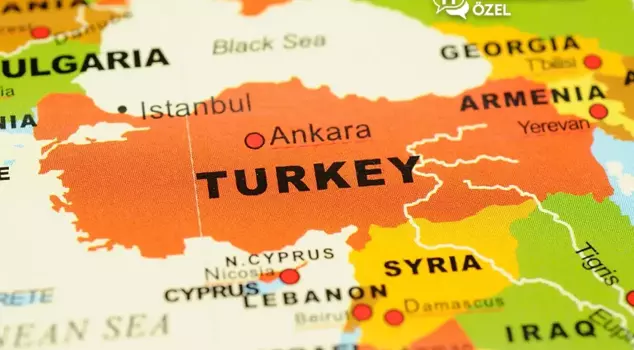
04.01.2025 15:52
A great potential lies right next to Turkey. Prof. Dr. Hasan Okuyucu and Prof. Dr. Salah Hajismail stated that Turkey has common history and regional cooperation opportunities with Iraq, Syria, Lebanon, and Jordan. They evaluated what needs to be done to utilize this potential in an interview with Abdurrahman Yazıcı, the host of Haberler.com.
Prof. Dr. Hasan Okuyucu and Prof. Dr. Salah Hajismail, faculty members of Ankara Yıldırım Beyazıt University, evaluated the potential next to Turkey with Abdurrahman Yazıcı, the Economy News Editor of Haberler.com. Both experts pointed out that there are some economic challenges in the region, but emphasized that geographical proximity and cultural similarities could awaken great potential through technology and human resource sharing. Prof. Dr. Okuyucu and Prof. Dr. Hajismail expressed the following views:
COMMON HISTORY AND REGIONAL COOPERATION OPPORTUNITIES
Turkey, Iraq, Syria, Lebanon, and Jordan have long coexisted under the same administration, sharing common cultural, historical, and social values. This common past is still evident in many shared values such as traditions, lifestyles, and commercial practices. However, these countries have been struggling with security issues and economic challenges for some time, and despite their geographical proximity and cultural similarities, they have not sufficiently developed their trade and economic relations.
Although Turkey and Syria established a strategic cooperation council in 2009, signing more than 50 agreements including free trade and visa-free travel, and later including Lebanon, Iraq, and Jordan in this cooperation, aiming for strong integration especially in the fields of economy, trade, and tourism, these efforts have been interrupted by the Arab Spring and the events in Syria after 2011.
In this context of cooperation, Iraq's oil resources and young population, Turkey's relatively advanced technological infrastructure and dynamic demographic structure, Syria's strategic geographical location and young labor force potential, and Lebanon and Jordan's educated workforce and entrepreneurial skills will play a key role.
An important advantage of this partnership is its potential to provide solutions in the fight against terrorism by creating an environment of security and stability through economic cooperation.
DEVELOPMENT DISPARITIES AND REGIONAL DISADVANTAGES
On a global scale, the gap between developed and developing countries is one of the main causes of economic imbalances. Developed countries hold a dominant position in global trade due to their advanced technologies, robust infrastructures, and high capital accumulation. In contrast, developing countries like Turkey, Iraq, Syria, Lebanon, and Jordan are disadvantaged in terms of economic growth and competitiveness due to these disparities.
This disadvantage becomes particularly evident in sectors requiring high technology. While developed countries increase efficiency with advanced technologies and strong logistics networks, developing countries often lack these capabilities and struggle to compete in global markets by exporting low value-added products.
GEOGRAPHICAL PROXIMITY AND CULTURAL SIMILARITY: SOLUTION PATHWAYS
Disadvantages arising from development disparities can be significantly reduced by regional advantages such as geographical proximity and cultural similarity. Geographical proximity can promote the growth of intra-regional trade by reducing transportation costs. For example, the export of heavy industrial products, agricultural products, and fast-moving consumer goods to neighboring countries may become more economical due to decreasing shipping costs.
Cultural similarities facilitate cooperation by eliminating barriers to trade. Common consumption habits and close social values accelerate the development of commercial relations. For instance, establishing joint production facilities between Turkey and Syria could not only revitalize regional trade but also allow for more efficient utilization of the region's workforce.
TECHNOLOGY AND INDUSTRIAL COOPERATION
The technological gap between developed and developing countries can be closed or minimized through regional cooperation. Turkey has a relatively more developed industrial infrastructure and technology compared to its neighbors. This advantage can be transferred to neighboring countries through joint production projects. For example, raw materials from Iraq and Lebanon can be processed in Turkey's facilities to be transformed into high value-added products, contributing to the economic growth of the entire region.
JOINT EDUCATION AND WORKFORCE PROGRAMS
Education and workforce development projects play a critical role in addressing development disparities. Turkey's universities and vocational schools can offer quality education opportunities to the region's young population. Common cultural values facilitate the adaptation to the educational process, enhancing the skills of the regional workforce and contributing to economic growth.
INCREASING GLOBAL COMPETITIVENESS
Another way to narrow the development gap is to strengthen the region's position in global markets through regional cooperation. Joint initiatives launched by Turkey, Iraq, Syria, Lebanon, and Jordan can collectively present their products and services to international markets, increase their competitiveness, and reduce their dependence on foreign economies. The establishment of joint brands and regional logistics centers can accelerate this process.
HOW CAN POTENTIAL BE EVALUATED?
Disadvantages arising from global development disparities can be largely overcome by effectively utilizing geographical proximity and cultural similarities. Trade and economic cooperation between Turkey and its neighboring countries not only enhances the welfare of the region's people but also strengthens the region's position in global markets. In this context, the implementation of joint production facilities, education programs, and technology transfer projects is crucial. Utilizing geographical and cultural advantages will help close the gap with developed countries and advance towards sustainable development.